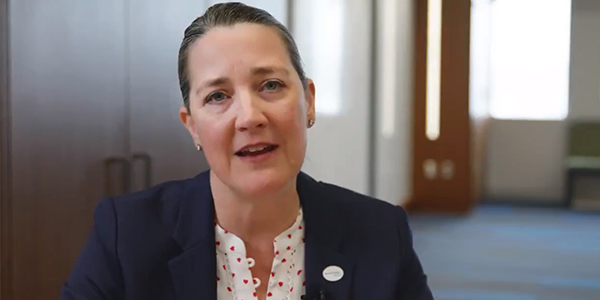By Amanda Durish Cook
Consumers Energy on Monday announced it plans to achieve net-zero emissions by 2040, putting the utility on track to achieve that goal a decade earlier than most of its peers in the industry.
The announcement means the Michigan utility will aim to offset all carbon emissions created by the electricity it generates or purchases within two decades.
In a release, CEO Patti Poppe admitted Consumers doesn’t have “all the answers yet” for reaching the goal but said it could counteract lingering emissions with “carbon sequestration, landfill methane capture or large-scale tree planting.”
Vice President of Public Affairs Roger Curtis said the move makes Consumers “the largest energy company in U.S. to plan net-zero this soon.”
“We have confidence in our ability to achieve that lofty ambition, though it’s about a decade earlier than most because of our Clean Energy Plan,” Poppe said in a video circulated by the utility. The Clean Energy Plan refers to the company’s 2019 integrated resource plan, which contains a goal to eventually meet 90% of Michigan’s energy needs with clean resources in addition to the new net-zero target. Consumers serves 6.7 million of the state’s almost 10 million residents.
“Consumers Energy is proud to take a stand for Michigan and for the planet. We are committed to take actions that eliminate our carbon footprint and do our part to combat climate change,” Poppe said. “Our Clean Energy Plan already is focused on protecting the planet, and our net-zero pledge takes that commitment to the next level.”
Consumers previously committed to an 80% reduction in carbon emissions from 2005 levels by 2040, a goal shared by Michigan’s other large utility, DTE Energy.
But the two companies now appear to be headed in different directions.
While DTE in 2018 announced it would strive for net-zero carbon emissions by 2050, its most recent IRP was recently sent back for major changes by the Michigan Public Service Commission, which ruled DTE hadn’t properly accounted for the benefits of renewable generation and relied too much on existing coal and natural gas generation. (See Michigan PSC Orders DTE to Redo IRP.)
Consumers, on the other hand, received approval in June for an IRP that proposed eliminating its coal fleet and reducing emissions from power plants by 90% by 2040. The company plans to retire the D.E. Karn plant in 2023 and idle Units 1 and 2 at its J.H. Campbell plant as early as 2025, replacing them with energy efficiency, solar and wind farms, and battery storage. The utility has already retired seven coal-fired power plants.
Fading Love for Coal
Poppe, who herself held positions at DTE until 2010, has been uncharacteristically candid for a utility CEO about Consumers’ obligation to cut emissions to mitigate the effects of climate change and her changing attitude toward coal-fired generation. She has repeatedly admitted she once dismissed climate predictions as alarmist.
“On that last day at every facility … it’s a heart-wrenching sort of day because of the effect and the change that’s happening to the people there,” Poppe said of attending coal plant closures on a Feb. 18 edition of the podcast “Illuminators,” which chronicles transformation and disruption in the energy industry.
“But you know, my co-workers are very proud of what they’ve done — as they should be — and very realistic and customer-centric to say that we care about our future generations and we care about making sure that we can, at the end of our days, look back and say that we did everything that we could to protect future generations from the effects of climate change.
“That just supersedes … in these tough decisions. But on the day of, you can bet, it’s a tough day for the people who are so deeply affected by the change,” Poppe said, who also admitted to once having a bumper sticker on her electric car that read, “I love coal.”
She told the Illuminators’ host that she’s since swapped it for a pink sticky note on her wall that reads, “I used to ‘heart’ coal.”
“I do think that coal had its time and place, and now we have the really great fortune that the economics have changed. We’ve got other clean energy technologies that can help us in ways that were not possible before. … We used to have this sucker’s choice: You can have clean energy — it’s just going to be expensive. Or, you can have the cheap and dirty stuff. Take your pick. We sold that story for a long time, and the reality is we don’t have to make that sucker’s choice anymore,” Poppe said.





